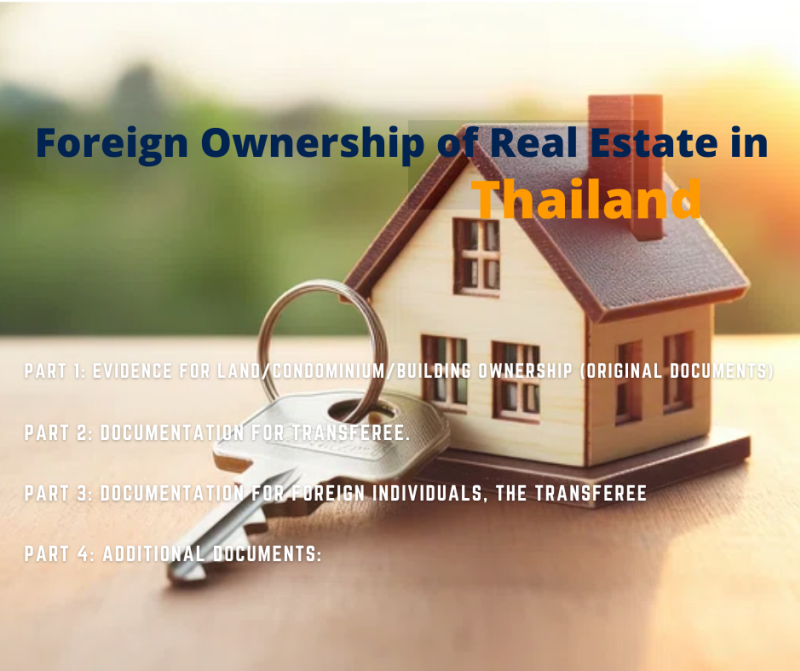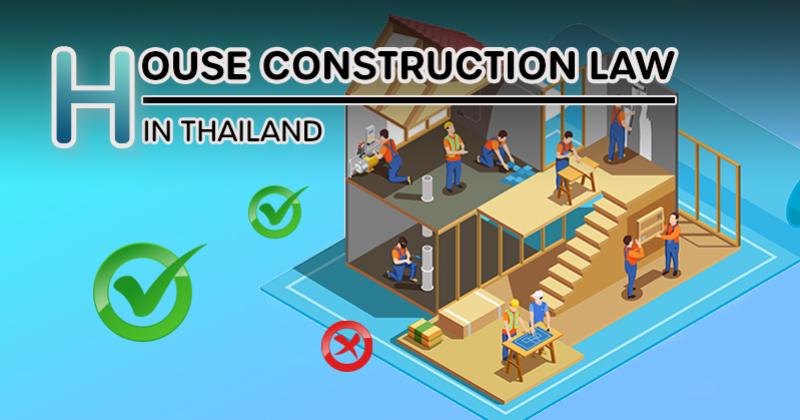
สร้างเมื่อ : 29 ม.ค. 2567
แก้ไขล่าสุดเมื่อ : 29 ม.ค. 2567
การถือครองอสังหาริมทรัพย์ของชาวต่างชาติในประเทศไทย- เอกสารประกอบการขอจดทะเบียน
สำหรับเอกสารประกอบการขอจดทะเบียนเพื่อถือครองอสังหาริมทรัพย์ของชาวต่างชาติในประเทศไทยนั้นแบ่งได้หลายส่วน ดังนี้
ส่วนที่ 1 คือ หลักฐานสำหรับที่ดิน/ห้องชุด/สิ่งปลูกสร้าง (ต้นฉบับ) ได้แก่ โฉนดที่ดิน/หนังสือรับรองการทำประโยชน์/หนังสือกรรมสิทธิ์ห้องชุด/หลักฐานการเป็นเจ้าของสิ่งปลูกสร้าง
ส่วนที่ 2 คือ หลักฐานสำหรับผู้โอน ประกอบไปด้วย
บุคคลธรรมดา
1.บัตรประจำตัวประชาชน
2. สำเนาทะเบียนบ้าน
3. ใบเปลี่ยนชื่อ/นามสกุล (ถ้ามี)
4. ทะเบียนสมรส (ถ้ามี)
5. มรณบัตรของคู่สมรส (ถ้ามี)
6. ทะเบียนหย่า/พร้อมบันทึกหลังการหย่า (ถ้ามี)
7. หนังสือยินยอมให้ทำนิติกรรมของคู่สมรส (ถ้ามี) พร้อมบัตรประจำตัวประชาชน สำเนาทะเบียนบ้านของคู่สมรส
กรณีผู้โอนตามมาตรา ศ๓ แห่ง ป.ที่ดิน
1. มรณบัตรหรือหลักฐานการตายของเจ้ามรดก
2. พินัยกรรมต้นฉบับ (ถ้ามี)
3. สำเนาพินัยกรรมที่เคยนำไปแสดงต่อหน่วยงานราชการ เช่น ศาล หรือสำนักงานที่ดินอื่น และพนักงานเจ้าหน้าที่ของหน่วยงานนั้นได้รับรองสำเนาถูกต้อง (กรณีพินัยกรรมสูญหายหรือถูกทำลาย)
4. บัตรประจำตัวประชาชนและสำเนาทะเบียนบ้านผู้จัดการมรดก (ถ้ามี)
5. ใบเปลี่ยนชื่อตัว/ชื่อสกุล ของเจ้ามรดกและผู้จัดการมรดก (ถ้ามี)
นิติบุคคล
1. หนังสือรับรองนิติบุคคล
2. รายงานการประชุมนิติบุคคล
3. ตัวอย่างลายมือชื่อกรรมการหรือผู้มีอำนาจทำการแทนนิติบุคคล
4. บัตรประจำตัวประชาชนและทะเบียนบ้านกรรมการ หรือผู้มีอำนาจทำการแทนนิติบุคคลพร้อมตราประทับ
5. หนังสือบริคณห์สนธิและวัตถุประสงค์
6. ข้อบังคับของนิติบุคคล
7. บัญชีรายชื่อผู้ถือหุ้น
ส่วนที่ 3 คือหลักฐานสำหรับคนต่างด้าว ผู้รับโอน
หลักฐานเกี่ยวกับคนต่างด้าว
1. ใบสําคัญประจําตัวคนต่างด้าวออกให้โดยสถานีตำรวจท้องที่ที่คนต่างด้าวมีภูมิลำเนาอยู่
2. หนังสือเดินทางเเสดงสัญชาติของคนต่างด้าว
3. หนังสือรับรองของเจ้าหน้าที่พนักงานกงสุล หรือสถานทูตที่ผู้นั้นสังกัดอยู่
4. หนังสือเเสดงสัญชาติ (emergency certificate) ซึ่งกระทรวงต่างประเทศออกให้เป็นการชั่วคราว
5. สำเนาทะเบียนบ้านผู้ขอร่วมทั้งผู้ที่มีชื่ออยู่ในทะเบียนบ้านดังกล่าวทุกคน (ถ้ามี)
6. ทะเบียนสมรส(กรณีขอรับมรดกในฐานะคู่สมรสของเจ้ามรดก)
7. ทะเบียนสมรสระหว่างบิดามารดาเจ้ามรดก (กรณีขอรับมรดกในฐานะบิดาของเจ้ามรดก)
8.หลักฐานการจดทะเบียนรับบุตรบุญธรรม (กรณีผู้ขอเป็นบุตรบุญธรรมของเจ้ามรดก)
หลักฐานที่มาของเงินที่นํามาลงทุน
1. หลักฐานการนำเงินตราต่างประเทศเข้ามาในราชอาณาจักร
2.หลักฐานการโอนเงินจากบัญชีเงินฝากเงินตราต่างประเทศ
3.หลักฐานการถอนเงินจากบัญชีเงินบาทของบุคคลที่มีถิ่นที่อยู่นอกประเทศเพื่อการลงทุน (หลักฐานที่มาของเงินที่นำมาลงทุนจะใช้ข้อหนึ่งข้อใดหรือหลายข้อรวมกันก็ได้แต่ต้องมีจำนวนไม่น้อยกว่า 40 ล้านบาท)
หลักฐานเกี่ยวกับการลงทุน
1. หนังสือรับรองการลงทุนจากผู้ขายพันธบัตรและพันธบัตร
2. หนังสือรับรองการลงทุนจากบริษัทหลักทรัพย์จัดการกองทุนรวมว่าได้ลงทุนในกองทุนรวมอสังหาริมทรัพย์ กองทุนรวมอสังหาริมทรัพย์เพื่อแก้ไขปัญหาในระบบสถาบันการเงิน หรือกองทุนรวมเพื่อแก้ไขปัญหาในระบบสถาบันการเงินที่จัดตั้งขึ้น ตามกฎหมายว่าด้วยหลักฐานและตลาดหลักทรัพย์และหลักฐานการลงทุนในกองทุนรวมดังกล่าว
3. หลักฐานการลงทุนในทุนเรือนหุ้นของนิติบุคคลที่ได้รับส่งเสริมการลงทุนตามกฎหมายว่าด้วยการส่งเสริมการลงทุน หนังสือรับรองการจดทะเบียนเป็นนิติบุคคล บัญชีรายชื่อผู้ถือหุ้นของนิติบุคคล และบัตรส่งเสริมที่แสดงว่านิติบุคคลดังกล่าวได้รับการส่งเสริมการลงทุนจากคณะกรรมการส่งเสริมการลงทุน
4. หลักฐานการลงทุนในกิจการที่คณะกรรมการส่งเสริมการลงทุนได้ประกาศให้เป็นกิจการที่สามารถขอรับการส่งเสริมการลงทุนได้ตามกฎหมายว่าด้วยการส่งเสริมการลงทุน หนังสือรับรองการจดทะเบียนเป็นนิติบุคคล บัญชีรายชื่อผู้ถือหุ้นของนิติบุคคล และหนังสือคณะกรรมการส่งเสริมการลงทุนที่ระบุว่ากิจการที่นิติบุคคลตังกล่าวดำเนินการอยู่เป็นกิจการที่สามารถขอรับการส่งเสริมการลงทุนได้ (หลักฐานเกี่ยวกับการลงทุนจะใช้ข้อหนึ่งข้อใดหรือหลายข้อรวมกันก็ได้แต่ต้องมีจำนวนไม่น้อยกว่าสี่สิบล้านบาท)
5. หนังสือรองรับจากสำนักงานโยธาธิการและผังเมืองจังหวัด ว่าที่ดินที่จะขอให้ได้มาอยู่ภายในบริเวณที่กำหนดเป็นประเภทที่อยู่อาศัยตามกำหนดว่าด้วยการผังเมือง (เฉพาะกรณีที่ดินนั้นอยู่นอกเขตกรุงเทพมหานคร เขตเมืองพัทยา หรือเขตเทศบาล)
6. หนังสือรับรองจากกระทรวงกลาโหม หรือหน่วยงานที่เกี่ยวข้องว่าที่ดินอยู่นอกเขตปลอดภัยในราชการทหารตามกฎหมายว่าด้วยเขตปลอดภัยในราชการทหาร
7.แผนที่สังเขปแสดงที่ตั้งที่ดินที่ขออนุญาต
8.สำเนาหนังสือแสดงสิทธิในที่ดินที่มีอยู่แล้วทุกแปลง (ถ้ามี)
ส่วนที่ 4 เอกสารเพิ่มเติมอื่น ๆ
1)คำสั่งศาลหรือคำพิพากษาซึ่งแต่งตั้งผู้ขอเป็นผู้จัดการมรดก (ถ้ามี)
2) เอกสารที่นำมาแสดงต่อพนักงานเจ้าหน้าที่ถ้าเป็นภาษาต่างประเทศต้องแปลเป็นภาษาไทยที่รับรองความถูกต้อง
3) หนังสือรับรองการปลอดหนี้จากนิติบุคคลอาคารชุด (กรณีโอนห้องชุด)
4) หนังสือรับรองของนิติบุคคลอาคารชุดที่รับรองว่ามีคนต่างด้าวถือกรรมสิทธิ์ในห้องชุดไม่เกินร้อยละ 49 ของเนื้อที่ห้องชุดทั้งหมดในอาคารชุดนั้น (กรณีโอนห้องชุด)
5) กรณีที่มีการมอบอำนาจให้ทำนิติกรรมแทน ต้องมีหนังสือมอบอำนาจ และบัตรประจำตัวประชาชนผู้มอบอำนาจ หรือสำเนาบัตรประจำตัวประชาชนและสำเนาทะเบียนบ้าน (ถ่ายเอกสาร) ที่ผู้มอบอำนาจรับรองความถูกต้อง พร้อมบัตรประจำตัวประชาชนและสำเนาทะเบียนบ้าน (ต้นฉบับ) ของผู้รับมอบอำนาจ
วันนี้ทางเพจของเราได้มานำเสนอข้อมูลเกี่ยวกับการถือครองอสังหาริมทรัพย์ของชาวต่างชาติในประเทศไทย- เอกสารประกอบการขอจดทะเบียนหวังว่าจะเป็นประโยชน์ต่อทุกท่านที่เข้ามาอ่านนะคะและทางเพจ The Property Center ยังมีบทความดีๆอีกมากมายสามารถเข้ามาอ่านกันได้ ทั้งนี้ลูกเพจท่านใดต้องการให้ทางต้องการหาบ้านหรืออสังหาริมทรัพย์อื่นๆ สามารถนำทรัพย์ของท่านมาฝากเราขายได้ เรามีลูกค้าที่ติดต่อเรามาทุกวันปล่อยให้มืออาชีพทำงานแทนคุณแล้วคุณรอรับยอดขายอย่างเดียว The Property Center ยินดีต้อนรับท่านเจ้าของบ้านทุกท่านค่ะ เรามีทีมงานโพสต์ตามสื่อออนไลน์ต่าง ๆ จัดทำโฆษณาลงโซเชี่ยวและมาร์เก็ตเพลสต่างๆ แทนท่าน บริการเหล่านี้ฟรี เพียงแต่เราคิดค่านายหน้า 3-5% เท่านั้น ติดต่อเราด่วนค่ะ
ขอขอบคุณข้อมูลจาก:
https://www.thailand.go.th/issue-focus-detail/010_011?hl=th

